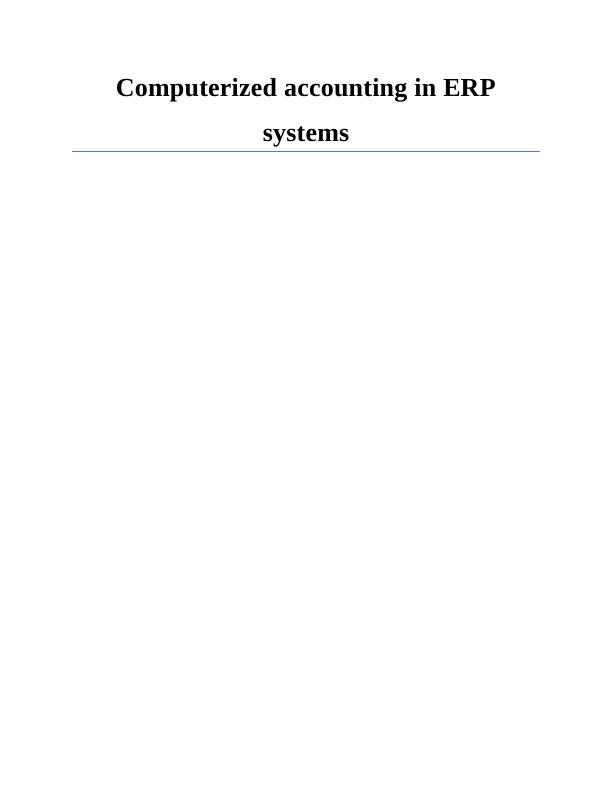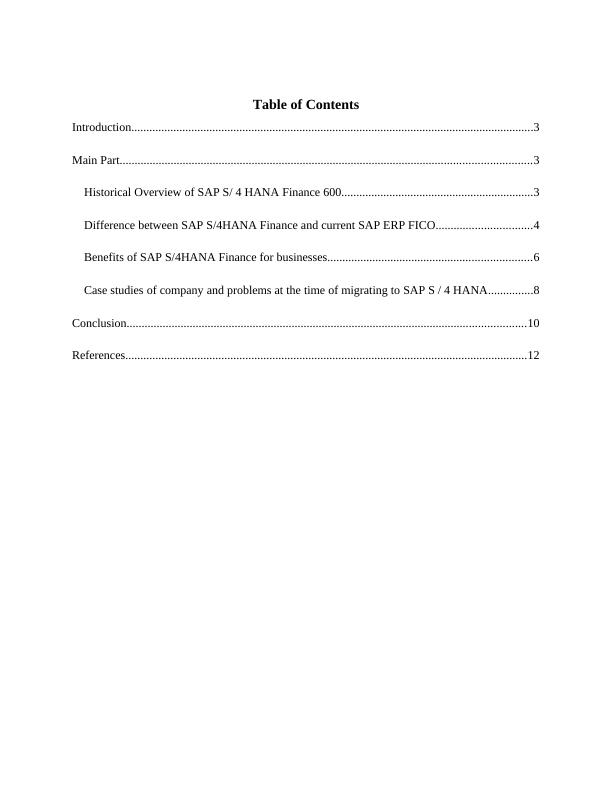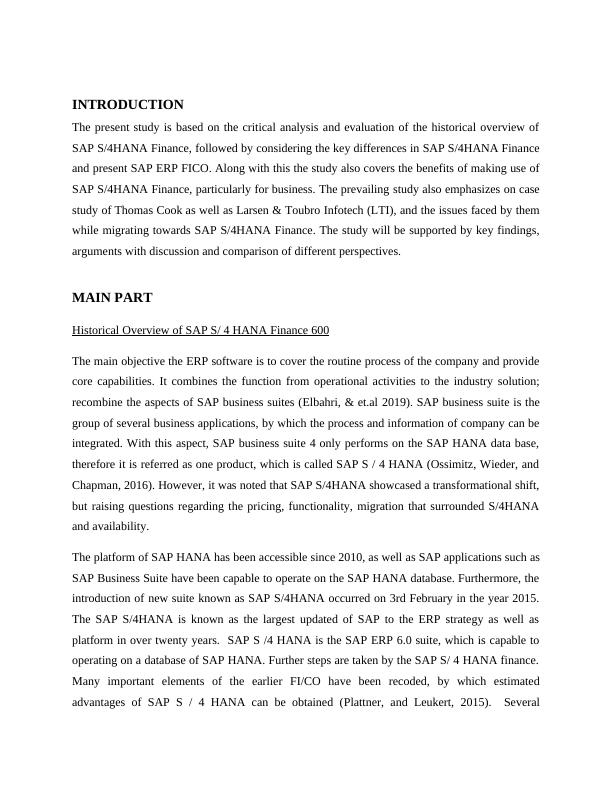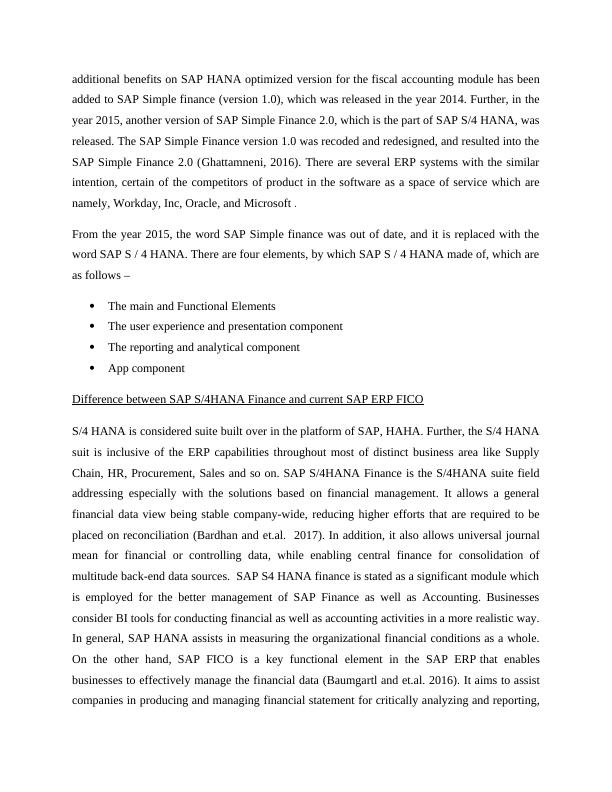Computerized Accounting in ERP Systems
Added on 2023-01-11
14 Pages4640 Words99 Views
Computerized accounting in ERP
systems
systems

Table of Contents
Introduction......................................................................................................................................3
Main Part.........................................................................................................................................3
Historical Overview of SAP S/ 4 HANA Finance 600................................................................3
Difference between SAP S/4HANA Finance and current SAP ERP FICO................................4
Benefits of SAP S/4HANA Finance for businesses....................................................................6
Case studies of company and problems at the time of migrating to SAP S / 4 HANA...............8
Conclusion.....................................................................................................................................10
References......................................................................................................................................12
Introduction......................................................................................................................................3
Main Part.........................................................................................................................................3
Historical Overview of SAP S/ 4 HANA Finance 600................................................................3
Difference between SAP S/4HANA Finance and current SAP ERP FICO................................4
Benefits of SAP S/4HANA Finance for businesses....................................................................6
Case studies of company and problems at the time of migrating to SAP S / 4 HANA...............8
Conclusion.....................................................................................................................................10
References......................................................................................................................................12

INTRODUCTION
The present study is based on the critical analysis and evaluation of the historical overview of
SAP S/4HANA Finance, followed by considering the key differences in SAP S/4HANA Finance
and present SAP ERP FICO. Along with this the study also covers the benefits of making use of
SAP S/4HANA Finance, particularly for business. The prevailing study also emphasizes on case
study of Thomas Cook as well as Larsen & Toubro Infotech (LTI), and the issues faced by them
while migrating towards SAP S/4HANA Finance. The study will be supported by key findings,
arguments with discussion and comparison of different perspectives.
MAIN PART
Historical Overview of SAP S/ 4 HANA Finance 600
The main objective the ERP software is to cover the routine process of the company and provide
core capabilities. It combines the function from operational activities to the industry solution;
recombine the aspects of SAP business suites (Elbahri, & et.al 2019). SAP business suite is the
group of several business applications, by which the process and information of company can be
integrated. With this aspect, SAP business suite 4 only performs on the SAP HANA data base,
therefore it is referred as one product, which is called SAP S / 4 HANA (Ossimitz, Wieder, and
Chapman, 2016). However, it was noted that SAP S/4HANA showcased a transformational shift,
but raising questions regarding the pricing, functionality, migration that surrounded S/4HANA
and availability.
The platform of SAP HANA has been accessible since 2010, as well as SAP applications such as
SAP Business Suite have been capable to operate on the SAP HANA database. Furthermore, the
introduction of new suite known as SAP S/4HANA occurred on 3rd February in the year 2015.
The SAP S/4HANA is known as the largest updated of SAP to the ERP strategy as well as
platform in over twenty years. SAP S /4 HANA is the SAP ERP 6.0 suite, which is capable to
operating on a database of SAP HANA. Further steps are taken by the SAP S/ 4 HANA finance.
Many important elements of the earlier FI/CO have been recoded, by which estimated
advantages of SAP S / 4 HANA can be obtained (Plattner, and Leukert, 2015). Several
The present study is based on the critical analysis and evaluation of the historical overview of
SAP S/4HANA Finance, followed by considering the key differences in SAP S/4HANA Finance
and present SAP ERP FICO. Along with this the study also covers the benefits of making use of
SAP S/4HANA Finance, particularly for business. The prevailing study also emphasizes on case
study of Thomas Cook as well as Larsen & Toubro Infotech (LTI), and the issues faced by them
while migrating towards SAP S/4HANA Finance. The study will be supported by key findings,
arguments with discussion and comparison of different perspectives.
MAIN PART
Historical Overview of SAP S/ 4 HANA Finance 600
The main objective the ERP software is to cover the routine process of the company and provide
core capabilities. It combines the function from operational activities to the industry solution;
recombine the aspects of SAP business suites (Elbahri, & et.al 2019). SAP business suite is the
group of several business applications, by which the process and information of company can be
integrated. With this aspect, SAP business suite 4 only performs on the SAP HANA data base,
therefore it is referred as one product, which is called SAP S / 4 HANA (Ossimitz, Wieder, and
Chapman, 2016). However, it was noted that SAP S/4HANA showcased a transformational shift,
but raising questions regarding the pricing, functionality, migration that surrounded S/4HANA
and availability.
The platform of SAP HANA has been accessible since 2010, as well as SAP applications such as
SAP Business Suite have been capable to operate on the SAP HANA database. Furthermore, the
introduction of new suite known as SAP S/4HANA occurred on 3rd February in the year 2015.
The SAP S/4HANA is known as the largest updated of SAP to the ERP strategy as well as
platform in over twenty years. SAP S /4 HANA is the SAP ERP 6.0 suite, which is capable to
operating on a database of SAP HANA. Further steps are taken by the SAP S/ 4 HANA finance.
Many important elements of the earlier FI/CO have been recoded, by which estimated
advantages of SAP S / 4 HANA can be obtained (Plattner, and Leukert, 2015). Several

additional benefits on SAP HANA optimized version for the fiscal accounting module has been
added to SAP Simple finance (version 1.0), which was released in the year 2014. Further, in the
year 2015, another version of SAP Simple Finance 2.0, which is the part of SAP S/4 HANA, was
released. The SAP Simple Finance version 1.0 was recoded and redesigned, and resulted into the
SAP Simple Finance 2.0 (Ghattamneni, 2016). There are several ERP systems with the similar
intention, certain of the competitors of product in the software as a space of service which are
namely, Workday, Inc, Oracle, and Microsoft .
From the year 2015, the word SAP Simple finance was out of date, and it is replaced with the
word SAP S / 4 HANA. There are four elements, by which SAP S / 4 HANA made of, which are
as follows –
The main and Functional Elements
The user experience and presentation component
The reporting and analytical component
App component
Difference between SAP S/4HANA Finance and current SAP ERP FICO
S/4 HANA is considered suite built over in the platform of SAP, HAHA. Further, the S/4 HANA
suit is inclusive of the ERP capabilities throughout most of distinct business area like Supply
Chain, HR, Procurement, Sales and so on. SAP S/4HANA Finance is the S/4HANA suite field
addressing especially with the solutions based on financial management. It allows a general
financial data view being stable company-wide, reducing higher efforts that are required to be
placed on reconciliation (Bardhan and et.al. 2017). In addition, it also allows universal journal
mean for financial or controlling data, while enabling central finance for consolidation of
multitude back-end data sources. SAP S4 HANA finance is stated as a significant module which
is employed for the better management of SAP Finance as well as Accounting. Businesses
consider BI tools for conducting financial as well as accounting activities in a more realistic way.
In general, SAP HANA assists in measuring the organizational financial conditions as a whole.
On the other hand, SAP FICO is a key functional element in the SAP ERP that enables
businesses to effectively manage the financial data (Baumgartl and et.al. 2016). It aims to assist
companies in producing and managing financial statement for critically analyzing and reporting,
added to SAP Simple finance (version 1.0), which was released in the year 2014. Further, in the
year 2015, another version of SAP Simple Finance 2.0, which is the part of SAP S/4 HANA, was
released. The SAP Simple Finance version 1.0 was recoded and redesigned, and resulted into the
SAP Simple Finance 2.0 (Ghattamneni, 2016). There are several ERP systems with the similar
intention, certain of the competitors of product in the software as a space of service which are
namely, Workday, Inc, Oracle, and Microsoft .
From the year 2015, the word SAP Simple finance was out of date, and it is replaced with the
word SAP S / 4 HANA. There are four elements, by which SAP S / 4 HANA made of, which are
as follows –
The main and Functional Elements
The user experience and presentation component
The reporting and analytical component
App component
Difference between SAP S/4HANA Finance and current SAP ERP FICO
S/4 HANA is considered suite built over in the platform of SAP, HAHA. Further, the S/4 HANA
suit is inclusive of the ERP capabilities throughout most of distinct business area like Supply
Chain, HR, Procurement, Sales and so on. SAP S/4HANA Finance is the S/4HANA suite field
addressing especially with the solutions based on financial management. It allows a general
financial data view being stable company-wide, reducing higher efforts that are required to be
placed on reconciliation (Bardhan and et.al. 2017). In addition, it also allows universal journal
mean for financial or controlling data, while enabling central finance for consolidation of
multitude back-end data sources. SAP S4 HANA finance is stated as a significant module which
is employed for the better management of SAP Finance as well as Accounting. Businesses
consider BI tools for conducting financial as well as accounting activities in a more realistic way.
In general, SAP HANA assists in measuring the organizational financial conditions as a whole.
On the other hand, SAP FICO is a key functional element in the SAP ERP that enables
businesses to effectively manage the financial data (Baumgartl and et.al. 2016). It aims to assist
companies in producing and managing financial statement for critically analyzing and reporting,

End of preview
Want to access all the pages? Upload your documents or become a member.
Related Documents
Woolworth and Telstra: Research Reportlg...
|16
|4701
|265
Computerized Accounting in ERPlg...
|17
|3906
|97
SAP S/4 HANA Finance: Overview, Differences with SAP ERP FICO, and Benefits for Businesseslg...
|19
|4807
|355
SAP S/4 HANA Finance Overview and Benefitslg...
|11
|3762
|72
Computerised Accounting in an ERPlg...
|18
|4313
|324
SAP S/4HANA Simple Finance 1lg...
|14
|4103
|500
